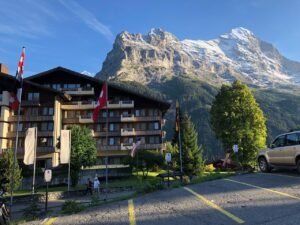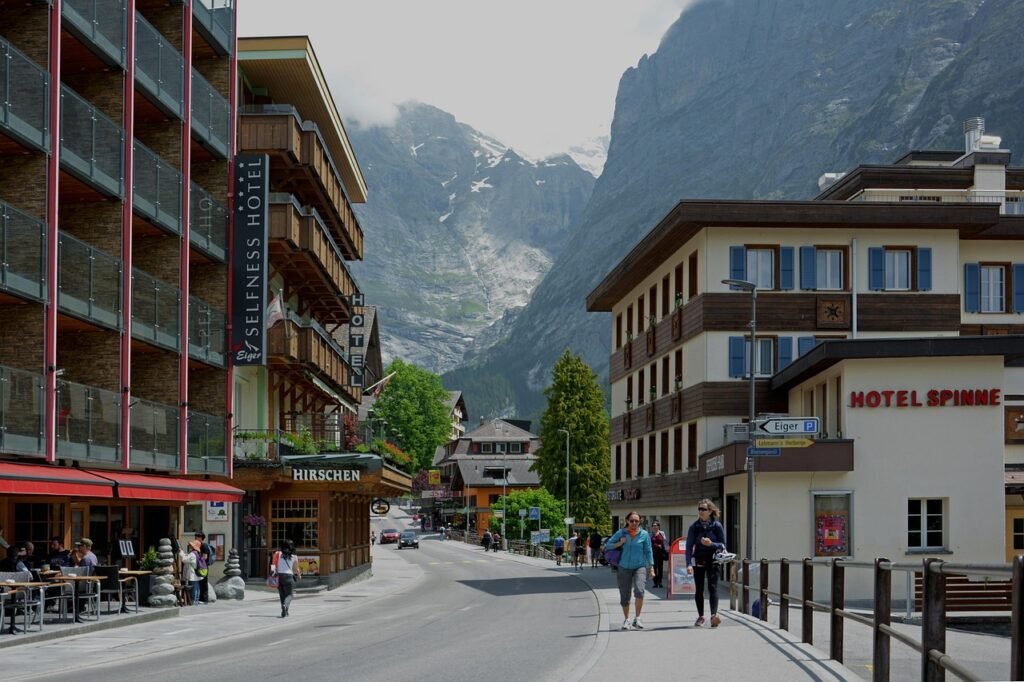Explore the heart of Europe—mountains, lakes, chocolate, and culture thoroughly await you!
Switzerland is rated to be a real picture-perfect country, with snow-topped Alps, crystal-clear lakes, cosy alpine villages… and, indeed, with one of the best chocolates and cheeses ever made in the world. It can be dreamy and overwhelming for a first-timer- where do I go first? How much does it cost? Do I need to speak German or French?
This all-encompassing guide covers everything you have to know before setting foot upon Switzerland for the first time-from learning about designing your route, choosing among the best cities, budgeting tips, transportation, cultural etiquette, food to try, and much more.
Why Visit Switzerland?
Switzerland is a small landlocked country located in Central Europe. It is still quite an attractive one when it comes to natural diversity: from snow-capped Alps to turquoise lakes and carpeted green meadows.
Main reasons to visit:
1.Breathtaking scenery at any time of the year.
2.Excellent and scenic public transport.
3.Very safe, clean, and tourist-oriented.
4.A variety of cultures, namely, German, French, Italian, and Romansh.
5.Europe’s finest hiking, skiing, and adventure sports.
When is the Best Time to Visit Switzerland?
1.Switzerland is a year-round destination; however, the experience differs with the season:
2.Summer (June through August): Loads of good weather for hiking and lake activities; sightseeing.
3.Fall (September to October): Less crowd, colorful foliage, chill temperatures.
4.Winter (December to February): Holy grail for skiing and snowboarding, visiting snow-tourist alpine villages.
5.Spring (March to May): Snow melting, flower blooming, low prices.
6.Beginners should consider late spring or early autumn for the least amount of crowds.
Language and Currency
Languages: There are four national languages — German (majority), French, Italian, and Romansh. English is widely spoken, especially in tourist areas.
Currency: Swiss Franc (CHF). Credit/debit cards are accepted almost everywhere.
Tip: Carry a small amount of cash for local shops or rural areas.
How to Get Around Switzerland
Switzerland has an efficient, clean, and scenic public transportation system among the best in the world.
Swiss Travel Pass
This is an absolute must-have for firsttimers. Offers unlimited travel on:
1.Trains (including scenic railroads like the Glacier Express)
2.Buses and boats
3.Local trams and buses in cities
4.Free entrance to 500-plus museums
Cost: Starts at around CHF 240 for 3 days (with others to choose from)
Where to buy them: Online or from the respective train stations
Scenic Railway Routes
Glacier Express: Zermatt to St. Moritz — viewing mountain panoramas.
Bernina Express: Chur to Tirano — crossing alpine peaks to Italy.
GoldenPass Line: Lucerne to Montreux—viewing picturesque lakes and hills.
Suggested 7-Day Itinerary For Beginners

Day 1-2: Zürich Switzerland’s biggest city remains tidy, hip, and culturally vibrant.
Things to do:
Explore Old Town (Altstadt)
Go Swimming / Boat Ride at Zürich Lake
Purchase in Bahnhofstrasse
Visit the Swiss National Museum
Where to Stay: Close to the city center or by the lake
Day 3: Lucerne
Fairytale city for its well-preserved medieval architecture.
Things to do:
1.Walk across Chapel Bridge(Kapellbrücke)
2.Visit the Lion Monument
3.Enjoy a boat trip on Lake Lucerne
4.Take the world’s steepest cogwheel train to Mount Pilatus or Mount Rigi
Where to Stay: Near Old Town
Day 4-5: Interlaken & Lauterbrunnen
Nestled between two lakes and surrounded by mountains, Interlaken is an adventure paradise.
Things to do:
Try paragliding, kayaking, or hiking
Day trip to Lauterbrunnen Valley – visit 72 waterfalls
Take a train to Jungfraujoch – “Top of Europe”
Where to stay: Interlaken or Lauterbrunnen for a peaceful vibe
Day 6: Bern (optional)
The Swiss capital is often overlooked but packed with charm.
Things to do:
Explore the UNESCO-listed Old Town
Visit the Bear Park
Climb the Zytglogge clock tower
Enjoy views from Rosengarten
Day 7: Geneva or Zermatt
Finish your trip with a taste of international or alpine Switzerland.
Geneva: A global city with UN headquarters, Jet d’Eau, and beautiful Lake Geneva
Zermatt: Home to the Matterhorn — a perfect base for hiking or skiing
Where to Stay in Switzerland
Switzerland can be expensive, but there are options for every budget.
Budget
Hostels (e.g., Backpackers Villa in Interlaken)
Airbnb or shared apartments
Budget hotels (Ibis, B&B Hotels)
Mid-Range
Boutique hotels
Alpine guesthouses
3-star hotels near city centers
Luxury
Lakeside resorts
Mountain lodges
Iconic hotels like The Dolder Grand in Zürich or The Chedi in Andermatt
What to Eat in Switzerland
Swiss cuisine is a delightful mix of hearty Alpine flavors and European influences.
Must-try dishes:
Cheese fondue – Melted cheese served with bread.
Raclette – Grilled cheese served with potatoes and pickles.
Rösti – Crispy shredded potatoes, like hash browns.
Swiss chocolate – Buy from brands like Läderach, Lindt, or Sprüngli.
Zürcher Geschnetzeltes – Veal in creamy mushroom sauce.
Tip: Coop and Migros supermarkets offer affordable meals and snacks.
Travel Tips for Beginners
1.Stay connected: Get a Swiss SIM card or eSIM for data
2.Pack layers: Weather can change fast in the mountains
- Stay hydrated: Swiss tap water is clean and safe to drink
- Respect quiet hours: Especially in villages and residential areas
5.Recycle properly: Switzerland is very eco-conscious
Budgeting for Your Trip
Switzerland is one of the most expensive countries to visit, but it’s manageable with smart planning.
Expense \ Daily Cost (Budget) \Daily Cost (Mid-Range)
Accommodation CHF 30–80 CHF 100–200
Food CHF 15–30 CHF 40–70
Transport (with pass) CHF 20–30 CHF 30–60
Attractions/Museums CHF 10–20 CHF 30–50
Tip: Swiss Travel Pass helps save a lot on transport + free museum entries.
Do You Need a Visa?
EU/EEA/Schengen country citizens: No visa required.
US, UK, Canada, Australia: Can visit for up to 90 days visa-free.
Other countries: Check Switzerland’s visa policy
Cultural Etiquette in Switzerland
Be punctual: Time is taken seriously.
Greet politely: A handshake and “Grüezi” (hello in Swiss-German) go a long way.
Keep noise low: Especially in public transport and hotels.
Tipping: Not mandatory, but rounding up is appreciated.
Cleanliness: Don’t litter, and always clean up after yourself.
Safety in Switzerland
Safety in Switzerland
Switzerland is one of the safest countries in the world. Violent crime is extremely rare.
Still, keep in mind:
Watch your belongings in busy areas or trains.
Emergency number: 112 (Europe-wide emergency)
Final Thoughts: Is Switzerland Worth Visiting for Beginners?
Absolutely! Switzerland is incredibly beginner-friendly, thanks to its safety, transport, and welcoming locals. Whether you’re into nature, adventure, culture, or food — Switzerland offers a memorable travel experience. It may be on the pricier side, but the views, vibe, and efficiency are well worth it.
If this is your first European trip or you’re planning a peaceful escape into the Alps — Switzerland won’t disappoint.
Quick Recap Checklist
1.Swiss Travel Pass
2.Explore Zürich, Lucerne, Interlaken
3.Try fondue and Swiss chocolate
- Enjoy scenic train rides
5.Stay in hostels, Airbnbs, or alpine hotels
6.Pack warm layers and comfy shoes
7.Respect the quiet culture
- Save money by using supermarkets and travel passes
Start planning now — and let Switzerland welcome you with open arms and snow-covered peaks!

